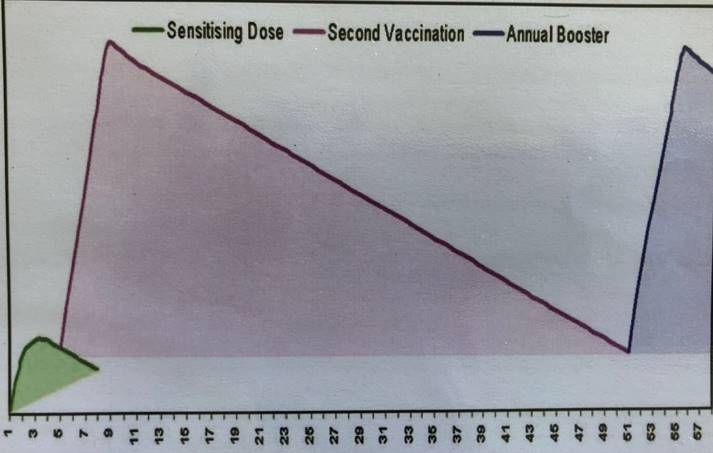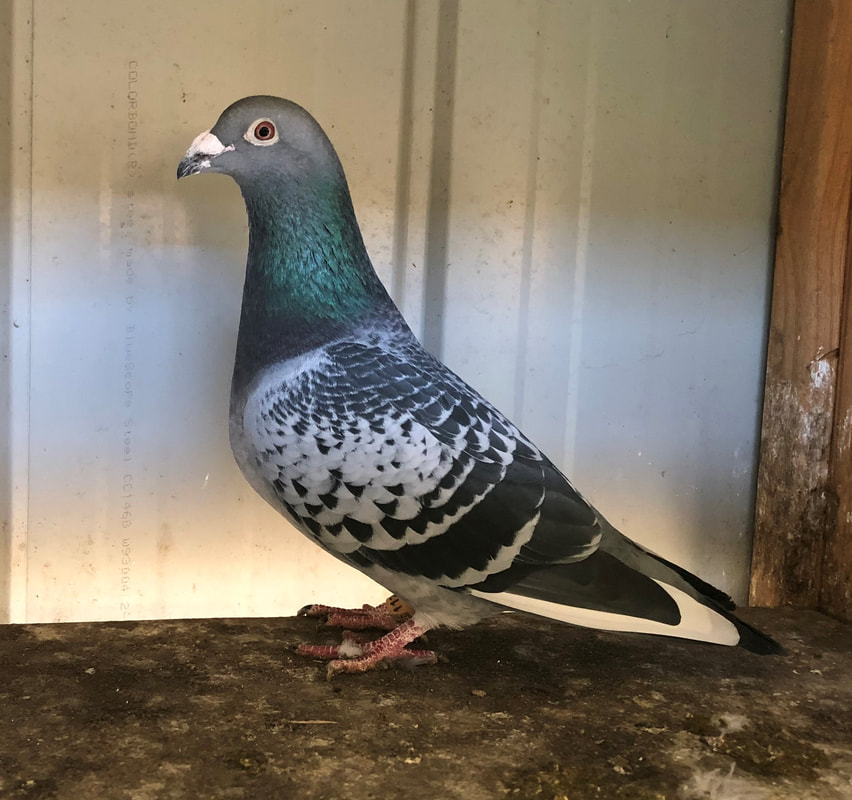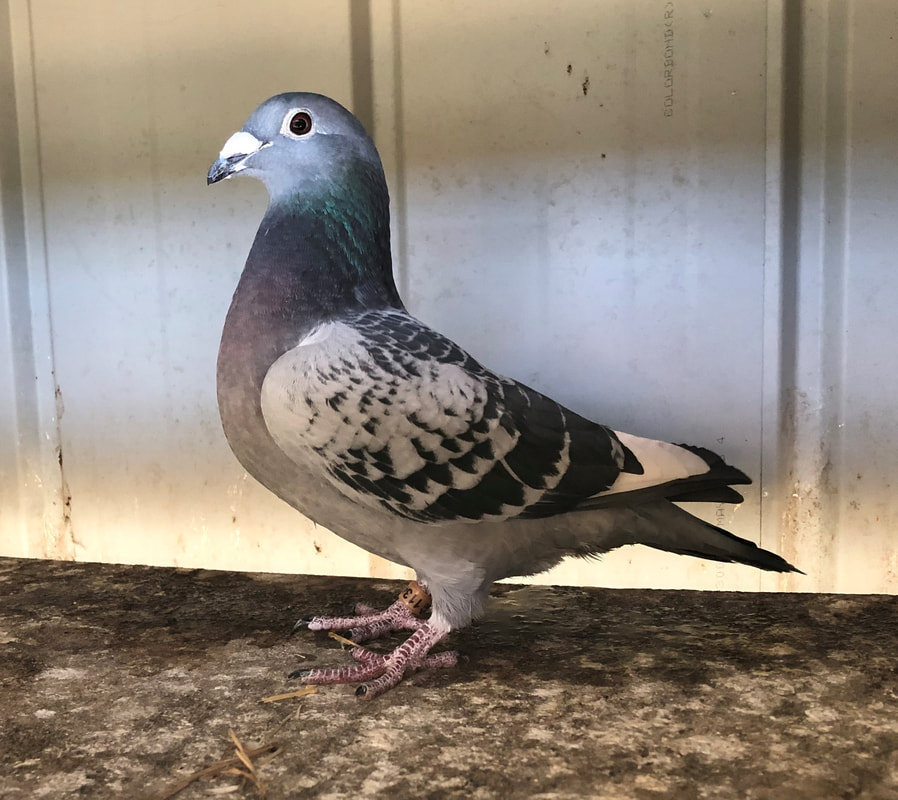- Home
- About
-
Health and Diagnosis
- Avian Influenza outbreak
- The Diagnostic Pathway
- Diagnosis at a Distance
- Dropping Interpretation
- Surgery and Anaesthesia in Pigeons
- Medical Problems in Young Pigeons
- Panting --it’s causes
- Visible Indicators of Health in the Head and Throat
- Slow Crop – it’s causes
- Problems of the Breeding Season
- Medications—the Common Medications used in Pigeons, their dose rates and how to use them with relevant comments
- Baytril—the Myths and Realities
- Health Management Programs for all Stages of the Pigeon Year
- Common Diseases
- Nutrition
- Racing
- Products
 Vaccination is the key to preventing some of the most serious pigeon diseases. Why Vaccinate Pigeons are vaccinated to protect against some of the common serious infectious diseases. Vaccination stimulates the body’s defense system to build immunity to a particular disease, by exposing pigeons to either the live organism presented in a safe form (eg Pigeon Pox vaccine) or to a killed organism (eg PMV vaccine), or an inactivated organism (eg Salmonella vaccine) or part of an organism (eg Rota virus vaccine). What vaccines are available? 1/ Paramyxovirus ( PMV ) vaccine . Two brands are available , Poulvac ( Zoetis ) or Newcavac (MSD) . Both are made from a killed La Sota PMV virus originally isolated from chickens. There have been several issues raised by fanciers over the last 7 years since these vaccines were first used :- a/ “but it is a chook vaccine” – it makes no difference what species of animal a particular virus was originally isolated from. The most important thing is the degree of antigenic overlap ie how similar two viruses are to each other . If two viruses are very similar then it more likely that the immune response elicited by the pigeon to one is likely to protect it against both viruses. Horses are actually immunized against Hendra virus using a canary pox vaccine! b/ “I want to use the NDV4 live PMV vaccine”-- in the vaccine trials we conducted in 2012 this vaccine did not stimulate the same amount of immunity as the killed La Sota vaccines. c/ Can the live NDV4 vaccine give my pigeons the disease--the NDV4 vaccine , even though it is alive, cannot give the pigeons PMV. It has been modified and is harmless. d/ “I want to use the PMV vaccine used in Europe made from a PMV strain isolated in pigeons” – when pigeons are vaccinated with the killed La Sota vaccine they form enough immunity to stop them getting sick but not enough to stop them getting infected with the virus. Vaccinated birds can carry the virus “ silently” for up to 60 days. The only advantage of the European pigeon origin PMV vaccine is that these silent infections are less likely to occur and when they do occur last for a shorter time. This makes no difference if all of the pigeons are vaccinated. And of course, it is illegal to import all avian vaccines into Australia. Fanciers who do so risk prosecution. 2/ Pigeon Pox vaccine 3/ Paratyphoid ( Salmonella vaccine ). Two pharmaceutical companies in Australia , Bioproperties and Treidlia both make Salmonella vaccines. I only have experience with the Bioproperties vaccine. I am sure that the Treidlia vaccine is effective and fanciers may wish to use this brand instead. 4/ Rota virus vaccine – Rotavax made by Treidlia. Timing of Vaccination is Crucial With most vaccines , but not all, it is usual to give two vaccinations. When two vaccinations are necessary timing is crucial. The first dose sensitizes the immune system and the second dose starts antibody production. Without the second booster dose, the initial vaccination only protects the pigeon for a short period of time, probably just weeks. The booster vaccination prolongs the protection period so that the pigeon is covered for about 12 months. An annual booster is then required to provide cover for a further 12 months. In summary THE SENSITIZING DOSE - Sensitizes the immune system - Initiates antibody production, takes several weeks - Protection provided is short lived, weeks to months THE SECOND VACCINATION - Increases immunity to protective level - Provides cover for 12 months - Cover is less protective as time passes since vaccination THE ANNUAL BOOSTER - Stimulates the immune system - Provides cover for a further 12 months This process is illustrated in the chart below. The vertical axis shows the level of immunity formed while the horizontal axis shows time in weeks. As can be seen , the first or sensitizing dose only stimulates a low and short term level of immunity. Timing of the second dose is crucial Chart used – courtesy of PIRSA How to use the Vaccines 1/ Salmonella ( Bioproperties) Preparing the vaccine: The vaccine comes in a 1000 dose vial. This needs to be kept frozen until use. The vaccine is dissolved into 100mls of water for injection. This is done by repeatedly rinsing the vial with sterile water (available through your vet ) using a needle and syringe until all of the vaccine is dissolved in the 100ml bottle of sterile water. The vaccine mixture must be used within 2 hours of preparation. Each pigeon is given 0.1ml of this mixture. How to give the vaccine: The vaccine can be given in 1 of 3 ways: 0.1ml injection under the skin at the back of the neck 0.1ml of vaccine can be given orally. The vaccine is equally well absorbed from the lining of the bowel as from an injection under the skin. Using this method it requires very little effort to protect your birds. The vaccine can be added to the drinking water at the rate of 10mls in 5 litres of water to vaccinate 100 pigeons. All of this water must be drunk within 2 hours for the vaccine to be effective. Because this is difficult to achieve this is regarded as a less optimal method. Two doses of vaccine are given 2-4 weeks apart. The vaccine is cheap – about $110 for 1000 doses 2/ PMV vaccine 2 doses of 0.5 ml ,4 weeks apart under the skin at the base of the neck after 6 weeks of age. Annual boosters are necessary In high risk situations a first shot can be given at weaning ie 4 weeks but as each pigeon needs 2 shots after 6 weeks of age this will necessitate giving 3 shots ( which is fine ) Other issues to consider a/cheesy lumps can occur at the vaccination site. These are due to infection. If a fancier is getting more than 1% of vaccinated birds with these he should reconsider his technique which may involve using a new needle every few birds b/ damage to the immune system – information has been circulated that the use of oil based vaccines ,such as PMV, damages the immune system in young pigeons and can cause reduced fertility in breeders. After a review of the veterinary literature, raising the issue in a chatroom of international experts, speaking to the vaccine manufacturer and also the appropriate Australian regulatory body there is just no evidence of this happening. Fanciers can use the vaccine with confidence that they are not damaging their birds c/passive immunity from parents – when breeding from vaccinated birds some of the breeders immunity can pass to their youngsters. This immunity that is acquired “passively” by the youngsters from their parents can interfere with them forming their own “active” immunity when they are , in turn, vaccinated. This “passive” immunity is all gone by 6 weeks of age. What this means is that the immunity formed by a youngster, bred from vaccinated parents, that is vaccinated under 6 weeks cannot be reliably predicted to protect that youngster. To be sure that the bird is immune it must receive 2 shots after 6 weeks of age. Fanciers can expect to pay about $200 for a 1000 dose bottle in Melbourne. 3/ Pigeon Pox A prick or scratch on the outside of the thigh is given after 6 weeks of age . Single vaccination confers life time immunity. A vial that potentially does 500 birds is about $90. 4/ Rota virus vaccine – We still have much to learn. A trial at Melbourne University in the new year will, hopefully , provide more answers. The current recommendation is that 2 vaccinations of 0.5 ml are given under the skin at the back of the neck 4 weeks apart. A 300ml bottle costs about $450 Pulling it all together. 1/After 6 weeks of age --- Give a 0.5 ml injection for PMV and separate 0.5ml injection for Rota under the skin of the neck; 0.1 ml Salmonella given orally (Bioproperties vaccine) . 2/ Four weeks later, same again, ie injection for PMV and separate injection for Rota; also 0.1 ml Salmonella given orally (Bioproperties vaccine) but in addition Pigeon Pox scratch on thigh.
11 Comments
4/14/2020 02:36:43 am
Pigeons are my love, one of my pigeons was died as I didn’t know about the vaccination in the start. However as you have mentioned each and every detail this is truly authentic and one should must follow it if you guys have pigeons.
Reply
2/7/2021 05:20:19 pm
I would like purchase a 1000 vile of Salmonella vaccine.
Reply
Sally
7/22/2021 07:29:48 pm
Hi, I’m a Perth based vet, wondering where to purchase the pigeon pox vaccine for a client,
Reply
1/13/2022 06:52:32 am
The article is really detailed and extremely helpful. Thanks to you, I can learn more about the importance of vaccination for pigeons, know what vaccines are needed, and when is the right time to give them. Moreover, I can know the detail on how to inject vaccines for pigeons and it made me feel like I am experiencing being a veterinarian. Many thanks to you.
Reply
Nick
11/9/2022 11:42:07 pm
I have seen on the internet that the PMV vaccine can be administered in the skin between the leg and the body? Is this correct?
Reply
Australian Pigeon Company
11/13/2022 09:13:15 pm
Further information on PMV and vaccination can be found here
Reply
Nick
11/13/2022 07:38:58 pm
Anyone know the answer?
Reply
Lisa R Buchman
3/2/2023 08:11:59 am
Hello. I would like to know since I have 1 pigeon I rescued her about a 14 months ago and she's indoors only not in cage but indoors. What vaccines would you recommend? Can she get viruses being alone without other pigeons? I just need to know if I should vaccinate her. She's a rock pigeon.
Reply
5/13/2023 12:01:52 am
I have give my bird Paratyphoid vaccine recently, looks everything fine to me afterwards.
Reply
Alice
4/16/2024 04:03:10 pm
Permanent solution to Herpes simplex…🌿🌿🌿🌿🌿🌿🌿🌿
Reply
Leave a Reply. |
AuthorDr Colin Walker Archives
October 2020
Categories
All
|


 RSS Feed
RSS Feed